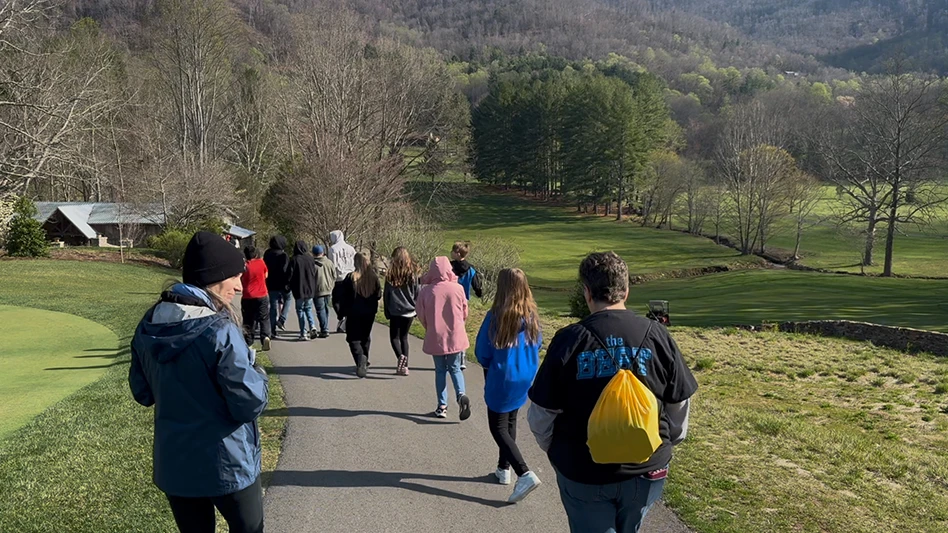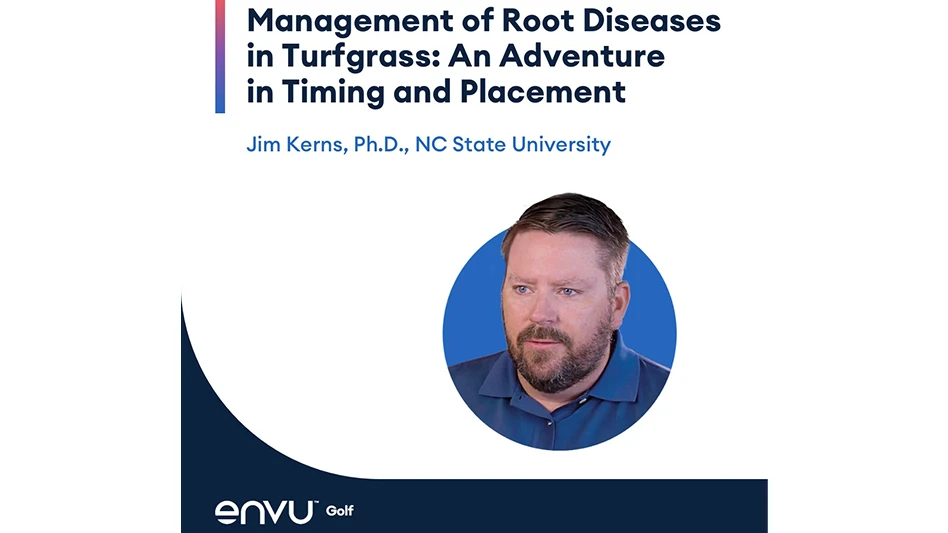Brian Zimmerman never imagined he’d one day be doing work similar to what he did as a kid.
Brian grew up on a family grain-and-beef operation in southern Wisconsin, between Basco and Paoli. Like nearly every other farm kid, he helped with the chores necessary in keeping beef cattle healthy. Each season saw him involved with crop production – cultivation, planting and harvest.
And these days, he is doing nearly same work as the executive director of Cleveland Metroparks, a job he started March 15. He is coming up on his first anniversary as only the sixth director in the park system’s 94-year history and is the youngest to ever fill that position. These days, the animal issues he faces don’t involve Angus or Herford cattle, but more unique animals like those found in Cleveland’s premier zoo. When I spoke to him recently he had just returned from checking progress on the zoo’s new elephant exhibit.
And those field crops he grew up around have been replaced by turf and trees, shrubs and flowers and a lot of other plants that require planting, cultivation and harvest, just like corn and soybeans.
Brian’s responsibilities at Metroparks are formidable. The park system, Ohio’s oldest, covers 22,000 acres, includes a zoo, seven golf courses, requires a $100 million annual budget and employs 600 people. He is, however, well prepared for the job, and the roots of that preparation are deep in golf turf. In fact, he is a former superintendent.
Whispering Pines farm is only a half hour from the University of Wisconsin – Madison, and it was an obvious choice for college for Brian. His career choice – turf management – was influenced by a couple of things – pleasant times on a golf course with his grandfather and the fact that his godfather (Randy Smith) was a golf course superintendent. Add to that the similarities between golf turf management and production agriculture, and the decision was easier for Brian than it is for most incoming freshmen.
Like most undergraduate turf students, Brian spent summers as an intern; the Nakoma Golf Club and Maple Bluff Country Club, both private courses, got him started on his career. Graduation led to a career launch in Milwaukee at the Brynwood Country Club, another private golf club where he was the assistant superintendent for three years.
An opportunity in public golf opened at the Washington County Golf Club north of Milwaukee, a new Arthur Hills course. Brian stayed there for about 18 months.
His next stop was the chance to become a golf course superintendent, at the Chikaming Country Club in Lakeside, Mich. It was at this job Brian fine-tuned his renovation and organizational skills as the club embarked on some significant changes and improvements. When Brian, wife Jill and son Carter left Wisconsin for Michigan, they thought that they would someday return to be near family.
They called Michigan home for three years. In 2002 Brian applied for the superintendent position at Brown Deer Golf Course, one of Milwaukee County’s 16 golf courses and the site of the US Bank PGA Tour event. After interviews and phone calls, Brian was asked if he would be interested in a regional manager position, making him responsible for all 16 golf courses. The position also included managing all turf areas in the park system. He took the job and was on his way to learning about running a big park system.
Brian’s work was noticed, and in 2007 he was named operations manager for the Milwaukee County Parks, Recreation and Culture System. It’s a large system – 15,000 acres, more than 400 employees and a $51 million budget. The park system received a national gold medal award during Brian’s tenure and that drew the attention of the Cleveland Metroparks as it began a search for a new executive director. The rest is, as they say, history.
Despite being separated by a generation, Brian and I have a lot in common. We are both former farm kids (and proud of it!) and we are both grads of Wisconsin’s turf program. Our golf course experiences in college were at the same two golf courses, and these courses have been managed for years by my colleagues and contemporaries Randy Smith and Tom Harrison. We were members of the same fraternity while we were undergraduates, and as a result I have known him since his late teen years. I caught up with Brain for a couple of hours one cold December afternoon and talked with him about the challenges of his new position.
Now that you’ve been working as executive director for almost a year, what kind of shape is Cleveland Metroparks in?
“I was really fortunate to follow in Vern Hartenburg’s footsteps. He directed Metroparks for 22 years and in his career won three national golf medal awards for excellence. This is an award a system can only apply for once every five years. Vern was an outstanding leader. Metroparks is known for its financial integrity and its reputation is second to none. Our branded logo is highly recognizable. We’ve had three clean audits with no negatives, usually unheard of. Vern changed the face and the dynamics of Metroparks and retired with our three main missions – conservation, recreation and education – well positioned for the future.
Was Vern Hartenburg available to help you transition into the position?
He was. And I was very happy about that. Vern was a Pugsley Award winner, an indication of his peers’ respect. I embraced the opportunity of learn from him. Anytime he spoke, I recalled advice I heard years ago – “You have two ears and one mouth for a reason.” Metroparks is a big operation and I valued his help after I arrived.
How is golf doing in Cleveland and the courses under your wing?
I just finished working through the budget process for golf and turf, our marketing program and the clubhouse operations. Our revenue and expense projections are such that a little subsidy will have to be provided. I guess we’re like the national situation – we’ve struggled. But we are on par with everyone else. We’re constantly looking to retool any aspect of the golf operation to improve it. We are planning to get people in their 50s and 60s more involved with golf since they have raised their families and may have a little more time. We are also talking about golf as a way to treat the “nature deficit disorder.”
Do you miss any of the day-to-day activities of being a golf course superintendent?
To be honest, I have the chance to participate in many diverse activities, from work with the zoo to working with a golf course architect like Bruce Mathews, to ranger details and labor bargaining. Variety is one of the appealing aspects of a superintendent’s career, and as the park director, I have even more. It’s much different, however, than dealing with day-to-day activities on a course. It might be that my job is actually less stressful!
What is your biggest challenge in operating such a large and diverse operation?
I have nine direct department reports coming to me. I look to helping bring out the best in all of them. We want our residents to be clear about the direction of Metroparks and have confidence in the way we run the different aspect of the park district. I focus on youth programs, our users of the future. Great staff is key to a successful organization.
You were elected president of the Wisconsin Golf Course Superintendents Association before you were selected for the Cleveland job, and you continued to lead the chapter through to the end of your first term. How much of a challenge was that?
I remember, as an undergraduate, helping Randy Smith assemble our chapter directory and I was impressed by his dedication to the chapter. As I moved along I saw that same loyalty in many superintendents in other projects. Watching colleagues banding together for a common cause was an inspiration. I wanted to give back to the Wisconsin chapter in the same way. I spent years on the board and as an officer, preparing myself to be president.
The other officers and directors were very happy for me to have this opportunity in Cleveland. Previous presidents had put our chapter in a position to hire a chapter manager, and that made it possible for me to preside from a distance. Technology made it easy to communicate – email, cell phones and Skyping.
My goal was to highlight the importance superintendents have in golf, not just turf. I believe I helped in that regard.
Has your farm upbringing influenced your career?
First of all, seeing the struggles of farming up close made it clear to me farming wasn’t anything I was interested in. There was always so much uncertainty, but there were lots of good lessons to learn. A farm is a small business and there is a lot to be learned from that. The job at hand had to get done. Farming teaches a stick-with-it attitude, which is always helpful. And I do believe in the old saw “You can take the boy off the farm but you can’t take the farm out of the boy.”
It is interesting that of the six of us who have served as executive director of Metroparks, three of us were raised on a farm.
Where do you see yourself in five years? Ten? At career’s end?
Right here in Cleveland. The opportunity I’ve been given is one I take very seriously. I look forward to renewing a number of levy campaigns. I’d be lucky to finish my career with Metroparks.
What advice do you have for a superintendent who may want to move beyond a golf course career?
Always put yourself in a position to learn and be successful. Don’t be afraid to try something out of your comfort zone. Think out of the box. Be willing to volunteer because the experience could be helpful in your future. Don’t limit yourself; always expand your experiences. GCI
Monroe Miller authors “The Monroe Doctrine” and is a frequent contributor to GCI.

Explore the January 2011 Issue
Check out more from this issue and find your next story to read.
Latest from Golf Course Industry
- The Aquatrols Company hires marketing manager
- Renovating Bredemus in West Texas
- Renovation starts at Okatie Creek GC at Sun City Hilton Head
- The Fittest Podcast in Turf: Episode 1
- New 6-hole course debuts in Oklahoma
- GCSAA announces Grassroots Ambassador Leadership Award recipients
- Reel Turf Techs: David Gummo
- PBI-Gordon promotes two to executive level







